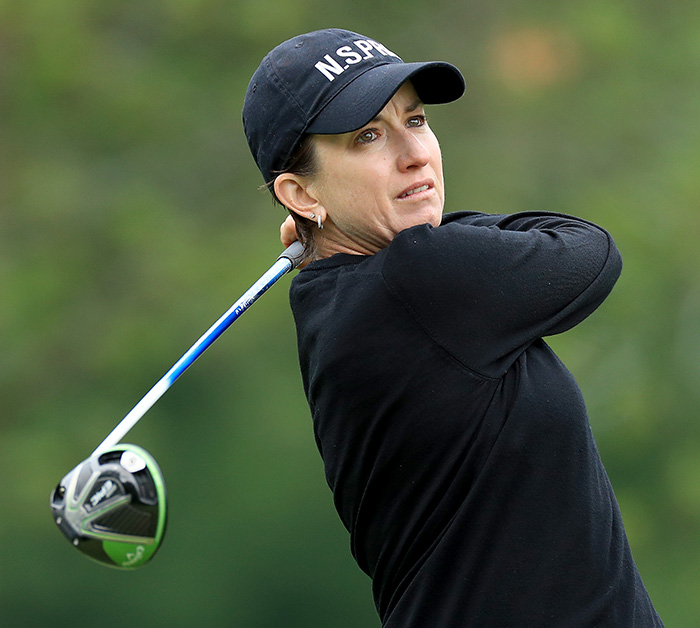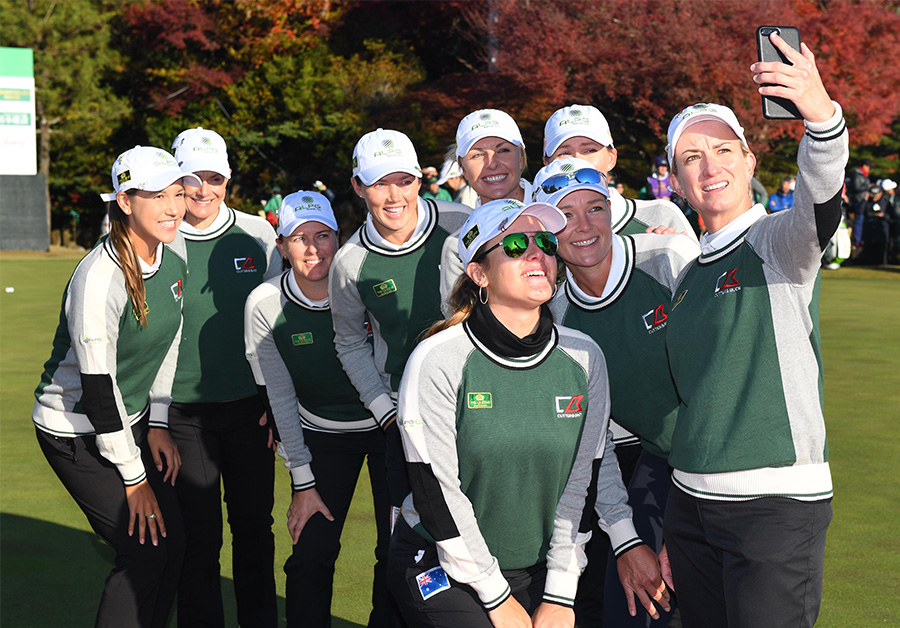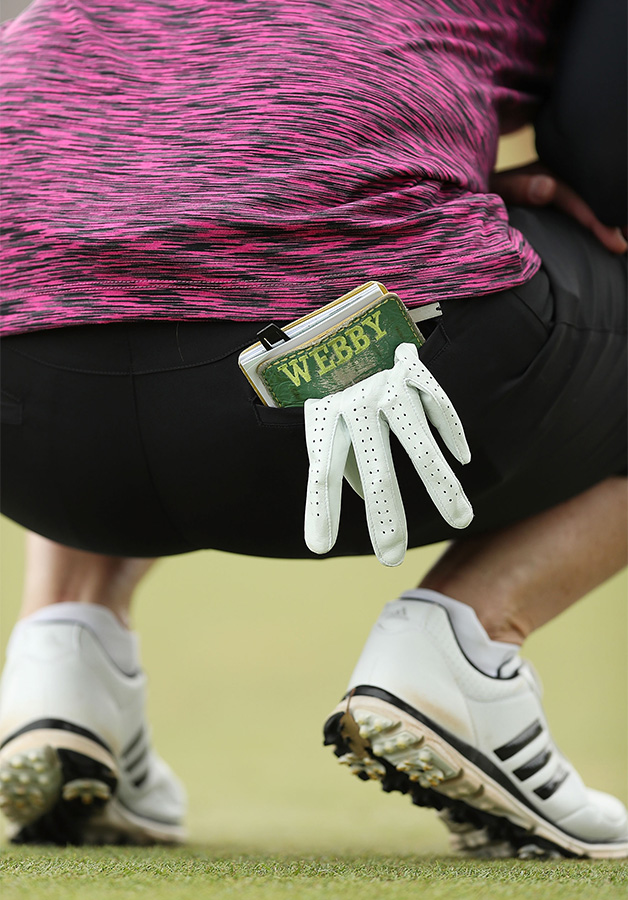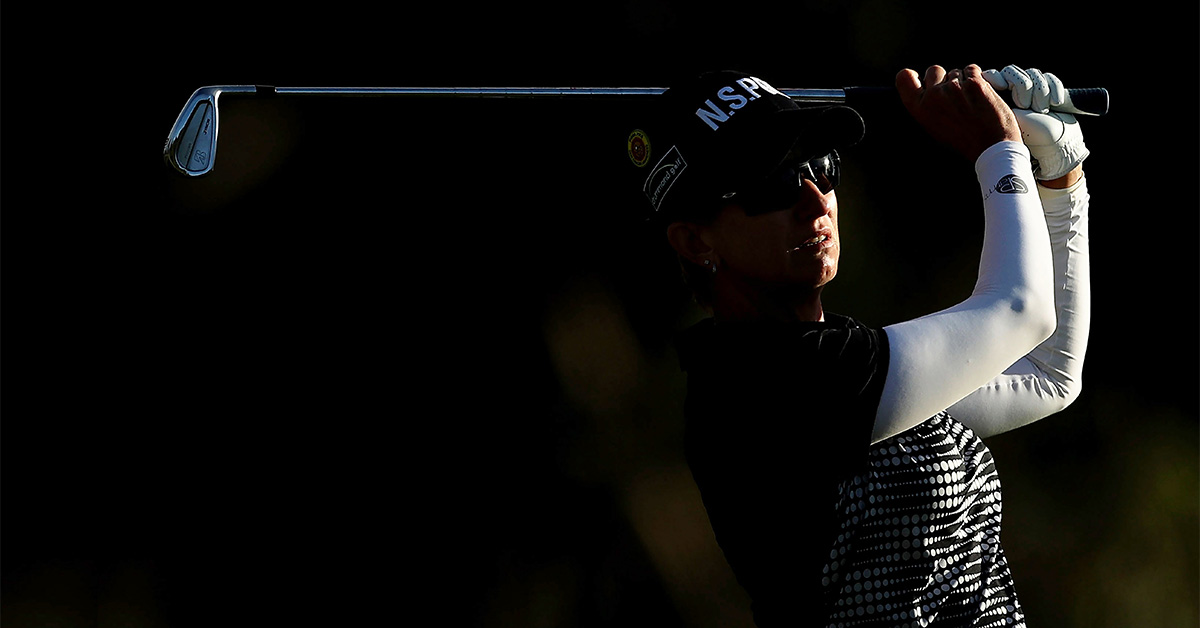We watched her elevation to the elite of world golf with awe yet never really got to know her as a person. It was the mask she needed to become a champion, yet as she reflects on 25 years as a professional, Karrie Webb says the person she was then is now in the past.
Karrie Webb | 44 | Boynton Beach, Florida | Australia’s greatest ever golfer
It wasn’t until the past half a dozen or so years of my career that I actually felt like I was sacrificing something. I’ve heard my mum say, “Karrie sacrificed her teenage years because she wanted to be a professional golfer,” but it was never a sacrifice to me. If I missed a party on a Saturday in high school because I was playing golf, it didn’t worry me. I was away playing golf.
▶ ▶ ▶
As I turned pro and went overseas, I was missing friends’ weddings, family birthdays and the like. I was upset I wasn’t there but it wasn’t a sacrifice. I chose golf every single time, and even the past five or six years I still chose golf, but that’s when I didn’t like how I kept choosing golf. That’s when it felt like a sacrifice and why I needed to wind things back because then I did start to feel like I was missing out on things. I’d never felt that way before. I would hope most people who make it to the top of their sport never see it as a sacrifice because I don’t know that you get there if you’re not sacrificing something.

My family just dealt with me through some of those years I was at the top of the game because I was so intense. I was so driven. As I got older I think they liked being around me a lot more because I was more relaxed. You don’t realise that you’re being like that at all until you’re away from it.
▶ ▶ ▶
When I was the best in the world or close to it, there were so many things outside the ropes I didn’t enjoy. I never didn’t push myself but there was a period of time when I envied to be No.3 in the world so no one would care about me anymore. I wouldn’t have all those other obligations.
“There was a period of time when I envied to be No.3 in the world so no one would care about me anymore.” – Karrie Webb
When I wanted to push myself, I was tired of the person I’d become that created it. I started to sense how people were around me. They were walking on eggshells and I didn’t like that I was causing people to be like that. I also didn’t like how hard I was on myself so I tried to dial that back, but by dialling it back… if I’d continued down that road I would have probably played worse.
▶ ▶ ▶
At the time it created who I was as a player. Being that hard on myself and everyone around me, that’s what made me good. Would I want it any differently? No, but I also don’t ever want to be that person again.
▶ ▶ ▶
It happened over time. It happened through experience. I became who I was partly to protect myself from the outside world and all of the stuff that was going on. I became like that more so because I was being criticised for who I was and how I was and what I wasn’t. I probably became more like that out of spite. I was determined to do it my way, I wasn’t going to do it anyone else’s way.
▶ ▶ ▶
Growing up in Ayr there were only a couple of other girls that played golf, but in North Queensland there was some decent competition until I was probably 13 or 14. That’s when I started travelling south for bigger tournaments but, in general, at Ayr Golf Club I practised with the boys. They were more to my standard or better than me. Playing matches on a Friday afternoon after school was always a challenge for me to try to win the pot at the end of the 18 holes.

Gender was never an issue in North Queensland. Growing up in the country, clubs want any members they can get. I didn’t ever really experience any discrimination or setbacks that way in North Queensland because I could go out to the golf course and practise whenever I wanted, get on the course pretty much whenever I wanted. If I couldn’t get on it wasn’t because I was a woman, it was because it was a members competition and I wasn’t playing with the adults yet. But once I did, I could play seven days a week.
▶ ▶ ▶
When I travelled south to the bigger cities I realised what other girls had to deal with. We played state 72-hole strokeplay events and we’d play Monday, Tuesday, have Wednesday off because that was men’s day, and then Thursday and Friday. Our four-day event took five days, and we surely couldn’t play on the weekends.
▶ ▶ ▶
Mum was my role model but sporting-wise, growing up in Australia, I didn’t have a lot of female role models. When I was 12 or 13 I was chomping at the bit to get any information I could on women’s golf and there was just never anything in the magazines. I wrote a letter to the editor once – they have reprinted it since – asking for more women’s content.
▶ ▶ ▶
At 11, I went to watch the 1986 Queensland Open at Coolangatta-Tweed and Greg Norman came home to play. He was No.1 in the world, won the British Open earlier in the year and that was the first professional event I ever went to. I came home and told my parents that I wanted to be a pro golfer.
▶ ▶ ▶
That summer I told them that if I wasn’t going to be a pro golfer, I was going to play cricket for Australia. Neither sport was all that visible as a woman but I knew there was women’s professional golf. I knew that it existed and playing cricket for Australia was not visible at all. Now, I wonder if I were 11 again, what would I have wanted to do? Would I have wanted to play cricket? Because that’s way more visible now.
▶ ▶ ▶
I was probably a better bowler than I was a batsman, believe it or not, mainly because I played indoor cricket. You just slapped it around in indoor cricket so my bowling got practised a lot more than batting. I never played any organised cricket on a field. I played with the boys at lunchtime in primary school but by the time you get to Grade 7 you probably shouldn’t be playing with the boys. My best friend in primary school, her parents owned an indoor cricket centre and girls were allowed to play indoor cricket. That’s why I played.
▶ ▶ ▶
I played with Alyssa Healy at the Australian Open pro-am and I’ve followed women’s cricket since it’s been televised. Now that they are being paid more, the standard has gotten so much better. I said to Alyssa that it must be great to be able to just be a cricketer and not have a full or part-time job in the middle of all that. The cricketers of the past who are coaches now, I said to them that they must think it is so amazing now because they didn’t have those opportunities. But they were a part of making it happen. I’m proud that in Australia we are being a leader in putting women’s sport at the forefront.
“I’m proud that in Australia we are being a leader in putting women’s sport at the forefront.” – Karrie Webb
I didn’t have any female role models. It obviously wasn’t a deterrent for me but I see it now and how important it is. You think about how women’s sport is being portrayed now and female superheroes starring in movies – that stuff didn’t exist when I was a little kid.
▶ ▶ ▶
It’s always been a boy’s right to play sport and it hasn’t always been a girl’s right. Therefore, it’s always been men’s sport that was covered as the pinnacle of athletic achievement. To me, the media’s goal is to imagine the girls being born now and growing up seeing equal coverage of men’s and women’s sport and knowing they have just as much right to play whatever sport they want and be the best at it and make a living from it.
▶ ▶ ▶
Playing in a men’s tournament wasn’t ever anything I was interested in. I hit it decently long in the women’s game but never long enough that I could compete from the men’s tees, so I didn’t see the sense in trying to play from that length. I knew it would be a very big, uphill battle. I admire the girls that do it but someone made the point recently about why women had to be compared to men. Both men’s and women’s golf is entertaining for what it is. Just because we don’t hit it 350 yards doesn’t make it any less entertaining.
▶ ▶ ▶
 It’s funny, Lexi Thompson hit driver and 9-iron into a par 5 recently and the trolls on Twitter were saying that it was downwind. She hit it 325 yards and then a 9-iron from 180. The 13th hole at Augusta plays 510 from the original tee, which is where the men played it from. The hole Lexi did it on was longer than that.
It’s funny, Lexi Thompson hit driver and 9-iron into a par 5 recently and the trolls on Twitter were saying that it was downwind. She hit it 325 yards and then a 9-iron from 180. The 13th hole at Augusta plays 510 from the original tee, which is where the men played it from. The hole Lexi did it on was longer than that.
▶ ▶ ▶
I’ve done some course-design work in the past and I’m really excited to be teaming up with Ross Perrett. I love the great courses in Australia: the Sandbelt courses, the three that we play in Adelaide are great courses. What I love about Australian golf courses is that they take the best of links golf and the best of American golf and it’s melded together. There’s that creativity of links golf – because usually in Australia you might be playing off some dodgy lies – and then around the greens you normally have a lot more options than just pulling out your 60-degree wedge. The bunkering is fantastic; you can’t replicate that in many other places in the world.
▶ ▶ ▶
There are similarities with American courses because you do play the ball in the air but you’ve got the option of hitting lower, running shots as well. That’s what my eye loves the most, and then whenever you play a great golf course there are always elements you pick out that you love.
▶ ▶ ▶
Picking a favourite Australian course is difficult but I’d say my favourite hole is the sixth at New South Wales Golf Club, the par 3. I played that at the Australian Junior in 1990 or 1991 and I was always awestruck by that golf course. Being right on the ocean, I’d never seen anything like it. And I was upset that the women’s tees weren’t out where the men’s were. I wanted to hit across the cliffs.

I’m very comfortable with who I am and where I’m at in life. When you’re in your early 20s, you’re still trying to find yourself and then you’re thrust onto the world stage. People can forget about that. I am quite comfortable in that now. I’ve had 25 years of an apprenticeship in terms of learning how to deal with the media and giving honest answers while being true to myself.
▶ ▶ ▶
I can honestly say I put every single bit I had into my career and squeezed every ounce of talent I had out of myself. I never wasted my opportunity. I talk to the girls coming through now about that. Up until recently, golf and tennis were the only two sports women could make a living at and I saw so many girls wasting that opportunity when so many other girls would kill to be where they were.
▶ ▶ ▶
All the wins and all of that is stuff that I dreamt of, but the longevity of my career and the fact I was 100 per cent committed to what I was doing my entire career, that’s what I’m most proud of.
Karrie Webb spoke with Tony Webeck



